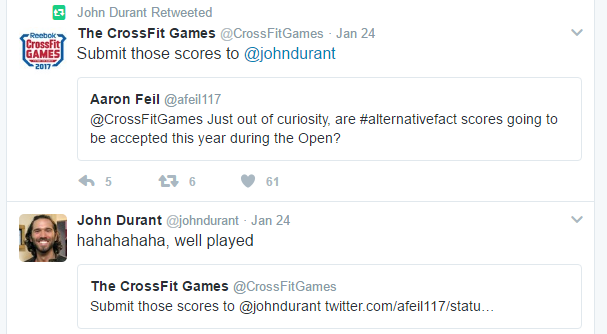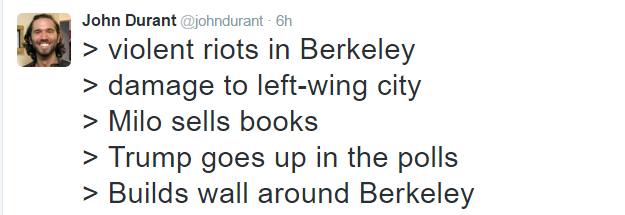Silicon Valley billionaire and Donald Trump backer Peter Thiel follows the paleo diet in hopes of reaching the ripe old age of 120, according to Bloomberg. Democratic socialist Bernie Sanders ate "paleo before paleo was a thing," per a People profile. But does paleo—which in its broadest sense refers to a diet centered on nuts, vegetables, and organ meats—lean in one political direction?The Paleo Manifesto, a 2014 book about the diet, traces paleo's nutritional profile through a series of historical vignettes, explaining how our bodies haven't yet adjusted to the shock of the wheat-based "agricultural revolution." The book is apolitical, aside from its place in academic debates over the value of evolutionary psychology and evolutionary medicine. But John Durant, Manifesto's Harvard-educated author, is not: he's firmly on the alt-right. Durant characterized the paleo diet that he champions as less avowedly political than previous iterations of the movement against processed foods."After World War II, pretty much all Americans ate the same processed food," he told me. "Historically, left-wing political polarization of the food movement happened first. The early organic movement was closely aligned with vegetarianism, and both were politically polarized as left-wing. And even today, not a lot of right-wing [people are] vegans. But that meant if non-liberals wanted a healthier real food identity—and identity is an important source of long-term motivation—it basically didn't exist. So paleo provided a real food identity that was less politicized than the dominant left-wing plant-based movement."Twitter, Durant displays a swaggering, shoot-from-the-hip style while occasionally offering support for the political aims of Donald Trump and figures such as "Dilbert" cartoonist Scott Adams and Dutch nationalist leader Geert Wilders. But his book, he told me, largely ignores politics because the diet itself reaches across multiple demographics."I don't speak for everyone in paleo. There are dozens of reasons people eat paleo, and most of them are functional—such as autoimmune issues or weight loss—and have nothing to do with politics," he said. "And when it comes to politics, paleo is not monolithic and people hold all types of political views. So it'd be silly to over-generalize here. But relative to vegetarianism, paleo definitely attracts more conservatives, libertarians, independents and anyone who just doesn't by into the political and religious baggage of plant-based eating. More paths to eating real food is a good thing!"
Durant characterized the paleo diet that he champions as less avowedly political than previous iterations of the movement against processed foods."After World War II, pretty much all Americans ate the same processed food," he told me. "Historically, left-wing political polarization of the food movement happened first. The early organic movement was closely aligned with vegetarianism, and both were politically polarized as left-wing. And even today, not a lot of right-wing [people are] vegans. But that meant if non-liberals wanted a healthier real food identity—and identity is an important source of long-term motivation—it basically didn't exist. So paleo provided a real food identity that was less politicized than the dominant left-wing plant-based movement."Twitter, Durant displays a swaggering, shoot-from-the-hip style while occasionally offering support for the political aims of Donald Trump and figures such as "Dilbert" cartoonist Scott Adams and Dutch nationalist leader Geert Wilders. But his book, he told me, largely ignores politics because the diet itself reaches across multiple demographics."I don't speak for everyone in paleo. There are dozens of reasons people eat paleo, and most of them are functional—such as autoimmune issues or weight loss—and have nothing to do with politics," he said. "And when it comes to politics, paleo is not monolithic and people hold all types of political views. So it'd be silly to over-generalize here. But relative to vegetarianism, paleo definitely attracts more conservatives, libertarians, independents and anyone who just doesn't by into the political and religious baggage of plant-based eating. More paths to eating real food is a good thing!" Nevertheless, many prominent athletes and athletic promoters, from the UFC's Dana White and WWE's Vince McMahon to New England Patriots star Tom Brady and ex-Buffalo Bills coach Rex Ryan, supported Trump in the general election."Higher testosterone people do seem to be more right-wing—though this may be mediated by social class, with high T [testosterone] lower classes being more inclined to revolutionary politics," Durant said. "Even if you look at which Hollywood celebrities are more right-wing, it tends to be the muscle-bound action stars and tough guys. Or look at the political leanings of the military."When I asked about economic status and adherence to the diet—meat-eaters in industrialized societies have usually been better-off than poorer people who get most of their calories from carbohydrates—Durant noted that a well-functioning market could eventually sort those problems out."Even if folks devote a small portion of their food budget to higher quality food—especially animal products, which I think has the biggest ethical and environmental impact—it makes a huge difference to food startups getting off the ground. There is an asymmetry in the market where a $1 million lost in sales to Tyson doesn't mean as much as $1 million to a few farmers doing things right," he said, echoing one of the central arguments of Michael Pollan's best-selling study of food culture, The Omnivore's Dilemma.
Nevertheless, many prominent athletes and athletic promoters, from the UFC's Dana White and WWE's Vince McMahon to New England Patriots star Tom Brady and ex-Buffalo Bills coach Rex Ryan, supported Trump in the general election."Higher testosterone people do seem to be more right-wing—though this may be mediated by social class, with high T [testosterone] lower classes being more inclined to revolutionary politics," Durant said. "Even if you look at which Hollywood celebrities are more right-wing, it tends to be the muscle-bound action stars and tough guys. Or look at the political leanings of the military."When I asked about economic status and adherence to the diet—meat-eaters in industrialized societies have usually been better-off than poorer people who get most of their calories from carbohydrates—Durant noted that a well-functioning market could eventually sort those problems out."Even if folks devote a small portion of their food budget to higher quality food—especially animal products, which I think has the biggest ethical and environmental impact—it makes a huge difference to food startups getting off the ground. There is an asymmetry in the market where a $1 million lost in sales to Tyson doesn't mean as much as $1 million to a few farmers doing things right," he said, echoing one of the central arguments of Michael Pollan's best-selling study of food culture, The Omnivore's Dilemma. And though there are low-cost ways for poor people to eat paleo, such as hunting deer and shopping for bargain produce, improvements in the national diet won't happen overnight. "As for [feeding] the poor, it's a gnarly question. Many people in the food space are eager to tax things that are unhealthy or perceived as such, but I'm a little skeptical of that approach simply because central authorities have gotten it wrong so many times in the past," he said. "I also think there's a broader cultural issue, which Pollan has written about, where America never really had its own food culture and traditions in the way other nations have. And we're very atomized. And we don't cook anymore. And some women scorn the kitchen even though everyone's health went to shit once we outsourced cooking to big corporations—their traditional role was always an important one, and shouldn't be trivialized…whether by arch-feminists or workaholics or the right or whatever."In short, improving the quality of American food is an issue where Durant is more than willing to cross party battle lines. "Paleo also attracts smart people who take biological evolution seriously. That's the view I see most often in paleo tech circles," he said. "With all the confusion over health guidelines, it's a good heuristic for what's probably a healthy diet. Not some political statement."
And though there are low-cost ways for poor people to eat paleo, such as hunting deer and shopping for bargain produce, improvements in the national diet won't happen overnight. "As for [feeding] the poor, it's a gnarly question. Many people in the food space are eager to tax things that are unhealthy or perceived as such, but I'm a little skeptical of that approach simply because central authorities have gotten it wrong so many times in the past," he said. "I also think there's a broader cultural issue, which Pollan has written about, where America never really had its own food culture and traditions in the way other nations have. And we're very atomized. And we don't cook anymore. And some women scorn the kitchen even though everyone's health went to shit once we outsourced cooking to big corporations—their traditional role was always an important one, and shouldn't be trivialized…whether by arch-feminists or workaholics or the right or whatever."In short, improving the quality of American food is an issue where Durant is more than willing to cross party battle lines. "Paleo also attracts smart people who take biological evolution seriously. That's the view I see most often in paleo tech circles," he said. "With all the confusion over health guidelines, it's a good heuristic for what's probably a healthy diet. Not some political statement." On other subjects, Durant is a much more doctrinaire alt-righter. "Violent riots in Berkeley/damage to left-wing city/Milo sells books/Trump goes up in polls/Builds wall around Berkeley," he tweeted recently.
On other subjects, Durant is a much more doctrinaire alt-righter. "Violent riots in Berkeley/damage to left-wing city/Milo sells books/Trump goes up in polls/Builds wall around Berkeley," he tweeted recently.
Advertisement

Advertisement

Advertisement

